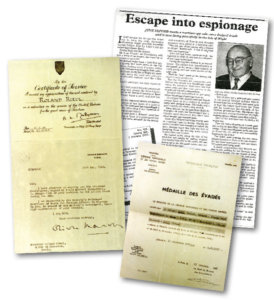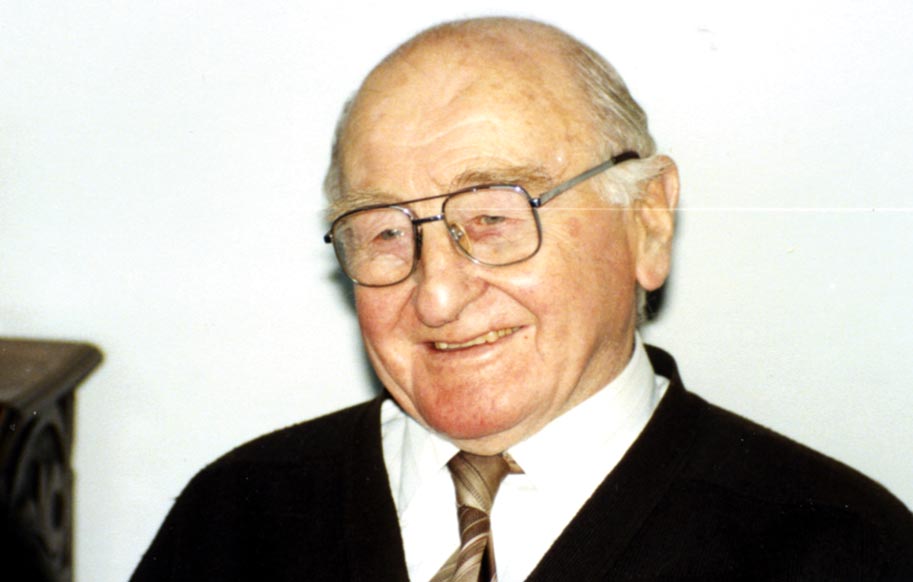 Seventeen years ago on a cold November afternoon I drove to Firestone Copse to meet a spy. Would he resemble one of John Le Carre’s characters. I wondered, or maybe James Bond, Ian Fleming’s top spy?
Seventeen years ago on a cold November afternoon I drove to Firestone Copse to meet a spy. Would he resemble one of John Le Carre’s characters. I wondered, or maybe James Bond, Ian Fleming’s top spy?
The man who opened the door of his house was like neither. He was an 85-year-old Frenchman every bit as charming as agent 007.
But Roland Rieul was my idea of a spy – dashing across frontiers, hiding from the Germans and meeting underworld types in Paris cafés. Speaking with just a trace of a French accent Roland told me his regiment was captured in France in 1940 and he was sent to a prisoner-of-war camp. The prisoners worked in an aircraft factory where he wrote a mixture of gossip and war news on the toilet paper in the latrines and also ‘mislaid’ some of the job sheets to delay the factory’s production.
The Gestapo soon got suspicious and he was moved to a disciplinary camp where the prisoners existed on a diet of thin soup and were made to dig trenches in sub-zero temperatures. Roland escaped with another man and managed to get on a train from Berlin to Stuttgart but they were caught and arrested by a Gestapo agent and sent by train to a reprisal camp in Russia. On the journey another prisoner managed to unlock a door and Roland said, “I knew it was only the fear of jumping from the train that was between me and freedom.”
He landed safely but the railway workers nearby handed him over to the SS guards who beat him up and put him back on the train. More determined than ever to escape, Roland was successful on his third attempt and using a home-made compass, walked through the forests and mountains to Switzerland. Once across the Swiss border he went to the British Consulate at Basle and showed them a sketch he’d drawn of a canal the Germans had camouflaged to stop Allied planes using it as a landmark. Roland told the people at the consulate that a ‘dummy’ canal had been made to look like a factory when it was a prisoner-of-war camp and hundreds of French and Russian prisoners were being killed in the raids.
Impressed by his story, someone in British Intelligence asked if he fancied being a spy. “And that was that,” Roland said, “I agreed but only until Paris was liberated.”
Next followed a period of recuperation and a big dossier to study on German codes, their methods and organisation. “Never let it out of your sight,” Roland was instructed but when an attractive blonde in the hotel invited him to join her for coffee, a note was slipped under his cup with a warning that she was an enemy agent. Roland’s new career as a spy had begun!
British Intelligence wanted him to go into France to find the information they needed. His cover was to be a watch smuggler, dangerous if any of the crooks in the Paris underworld he mixed with suspected him of being a British spy. “I knew I would end up with a second belly button”, Roland laughed.
The girlfriend of one of his shady acquaintances in Paris worked in a German military bakery. By bribing her to tell him how many sacks of flour were used every day, Roland could estimate the strength of the German garrison in Paris, he also reported on troop movements and made lists of high-ranking officers billeted in the Ritz. He discovered the whereabouts of a V1 rocket site by listening to two old ladies chatting on a train and describing a tunnel near their village.
 Although the Allies were winning war, the net was closing in on Roland when he returned to Paris on his last mission to find where the V2 rockets were being made. By now he had crossed the border into France 27 times and the Gestapo knew his name but luck was with him once more. He met a man who blurted out that he was working in an armaments factory and was scared of what would happen to him when the Americans arrived in Paris. Roland had the information he needed to pass on to London.
Although the Allies were winning war, the net was closing in on Roland when he returned to Paris on his last mission to find where the V2 rockets were being made. By now he had crossed the border into France 27 times and the Gestapo knew his name but luck was with him once more. He met a man who blurted out that he was working in an armaments factory and was scared of what would happen to him when the Americans arrived in Paris. Roland had the information he needed to pass on to London.
At the end of the war Roland was awarded the Croix de Guerre by the French government and a Certificate of Service from Field Marshal Montgomery. He returned to France many years later to meet Phillippe, one of his guides nicknamed ‘The Crow’, and the two men corresponded regularly for many years.
As I said good-bye to Roland I knew that few people in the Isle of Wight realised that just down the road was a man whose wartime exploits read like a film script.



